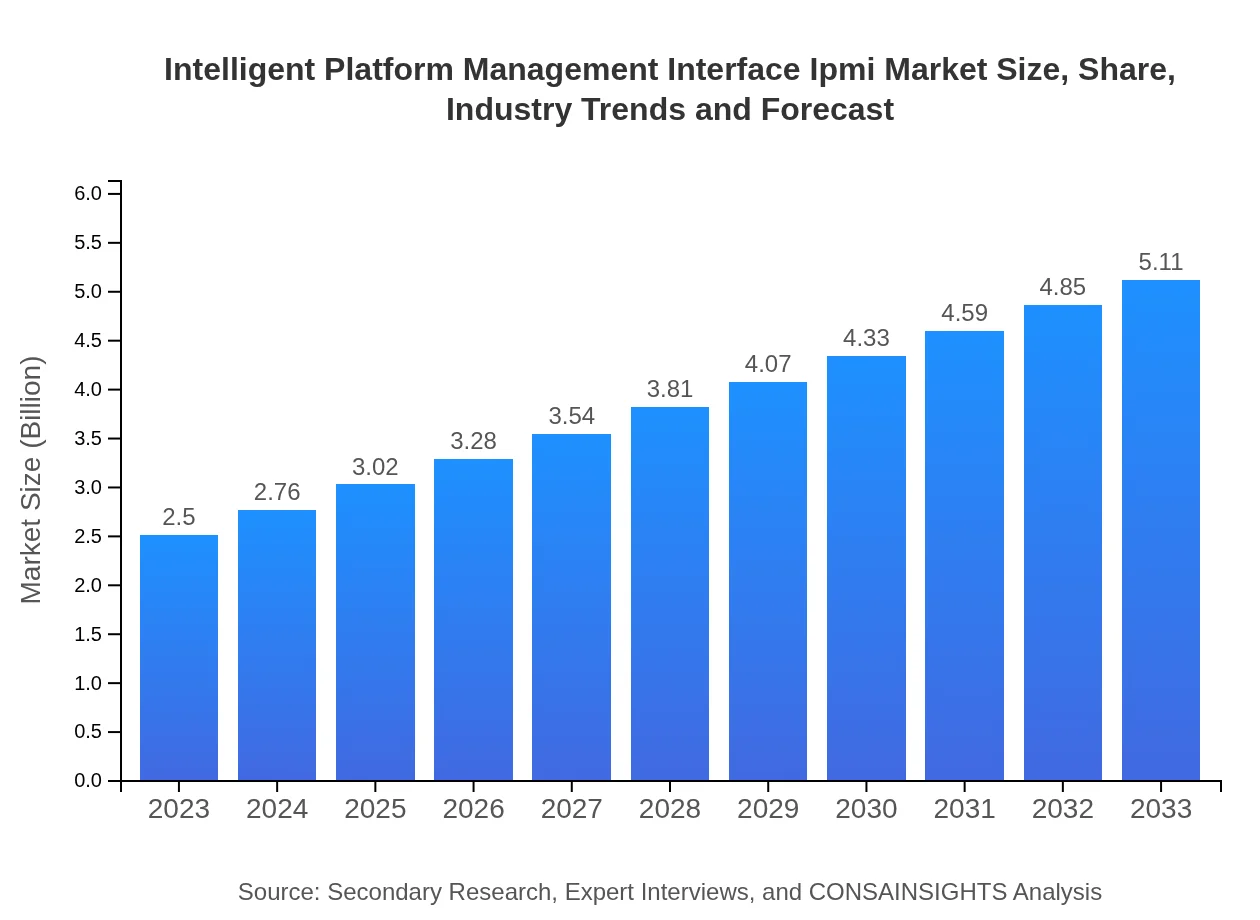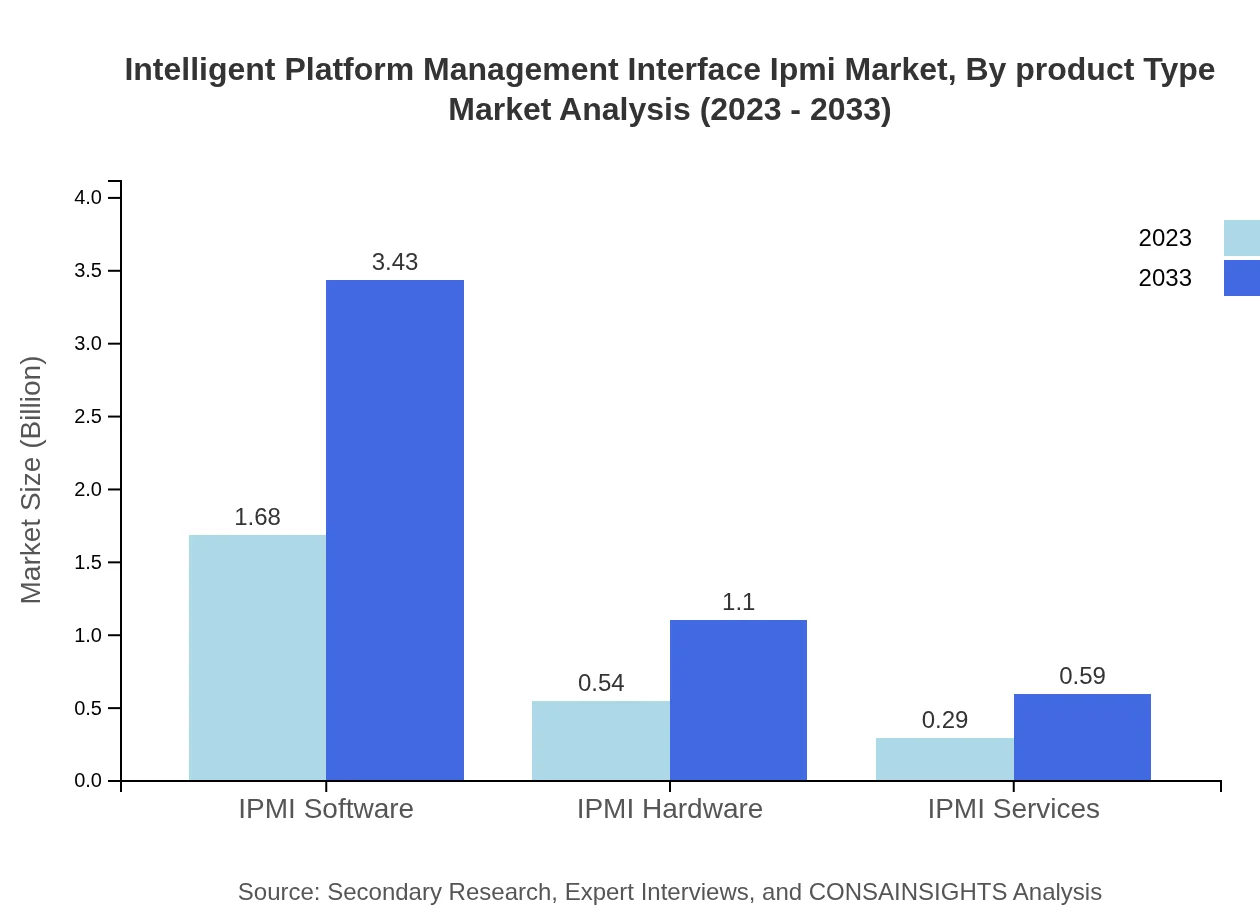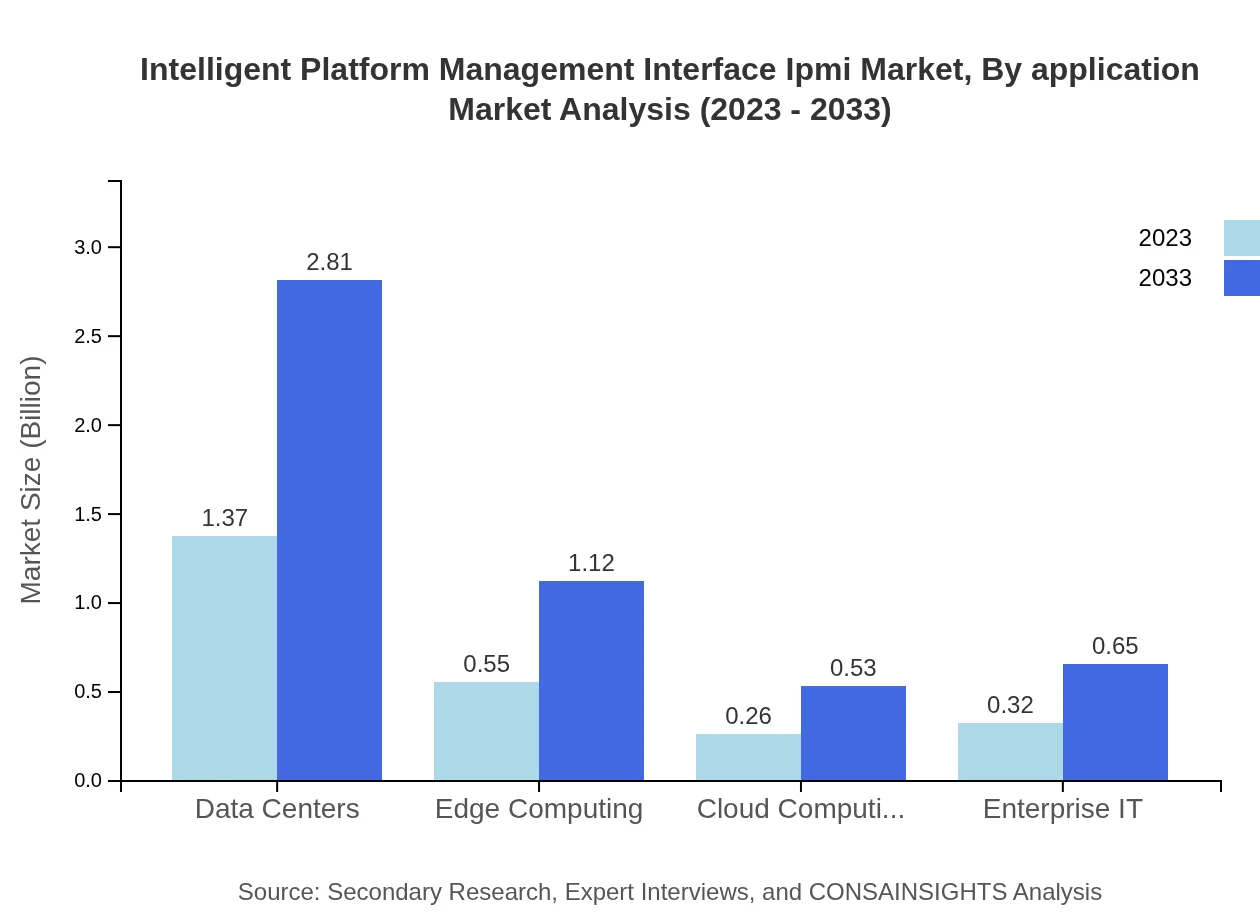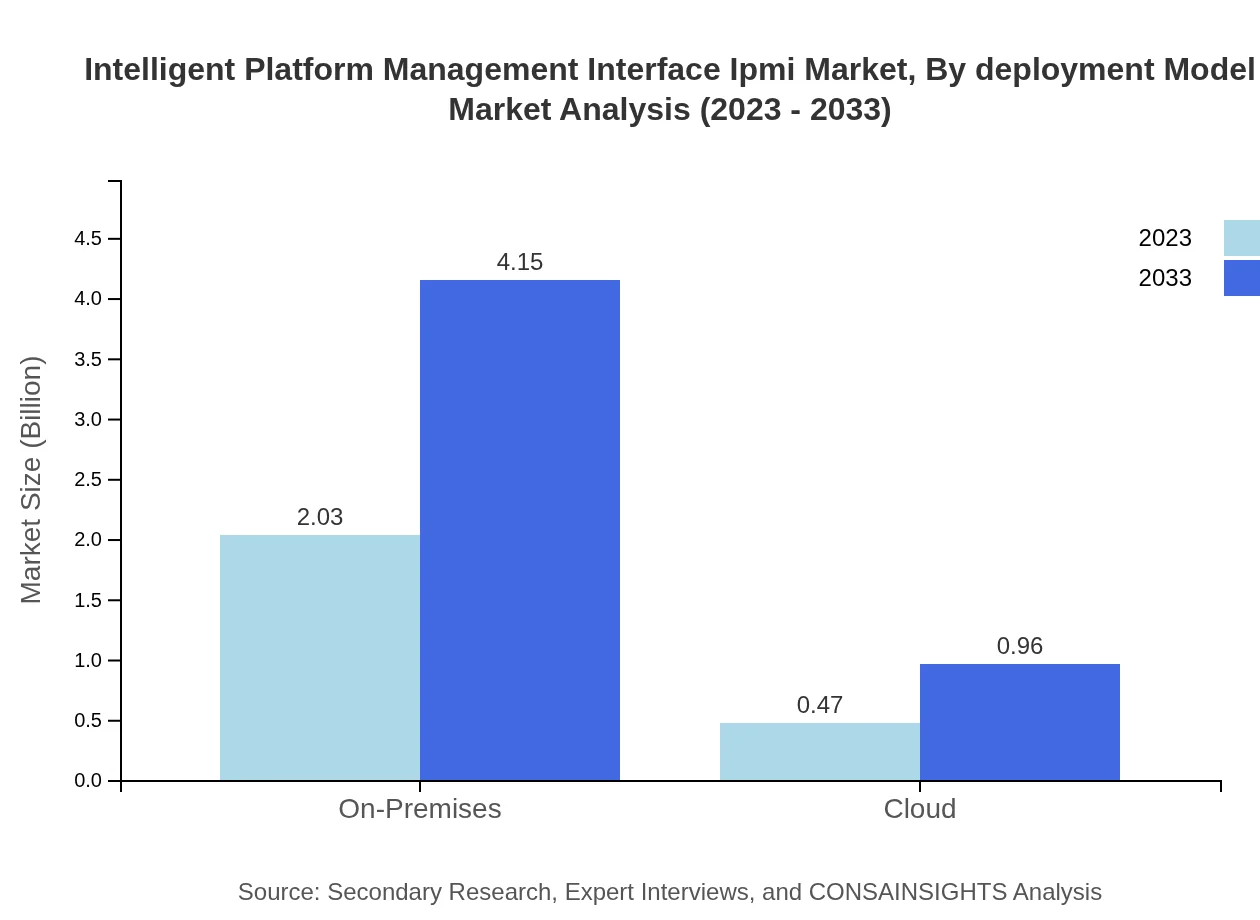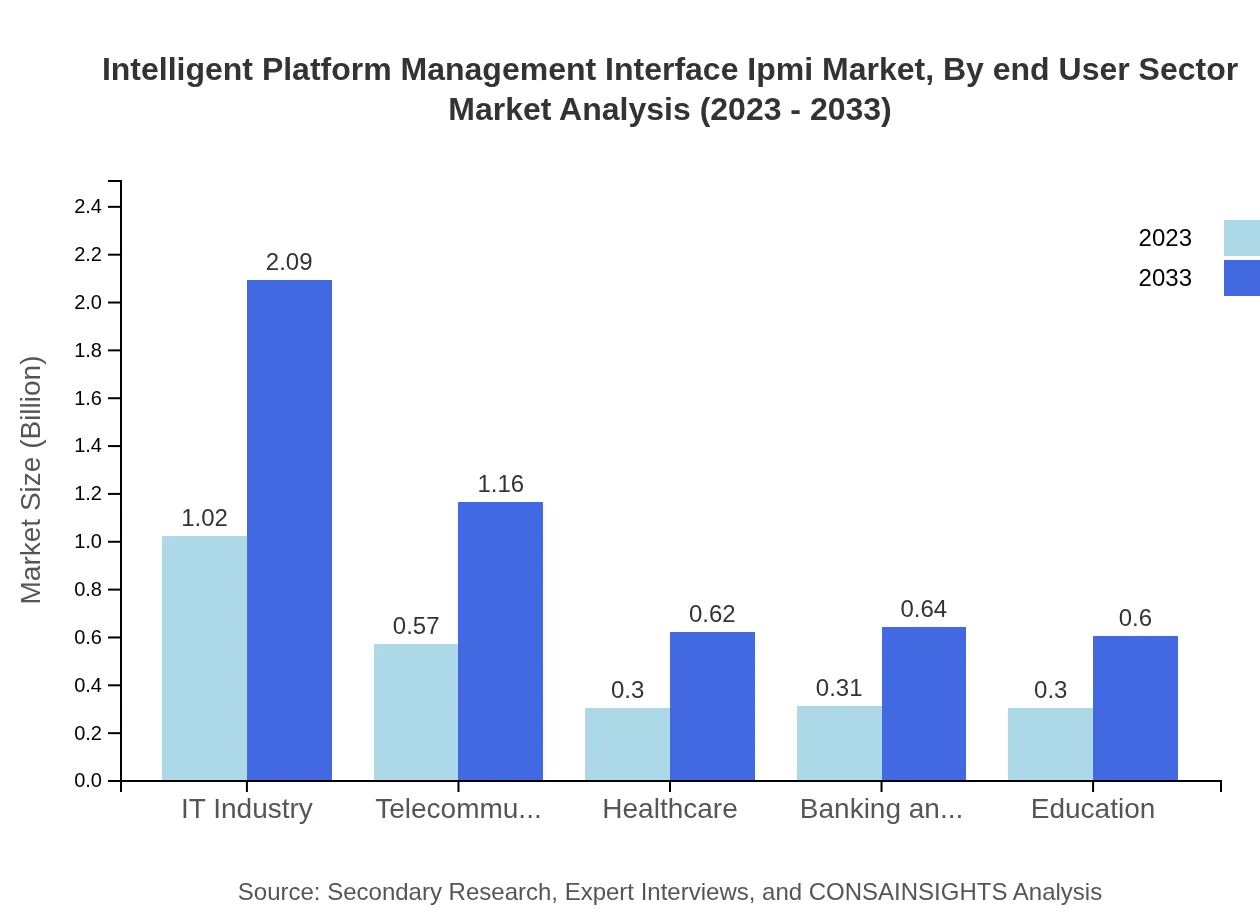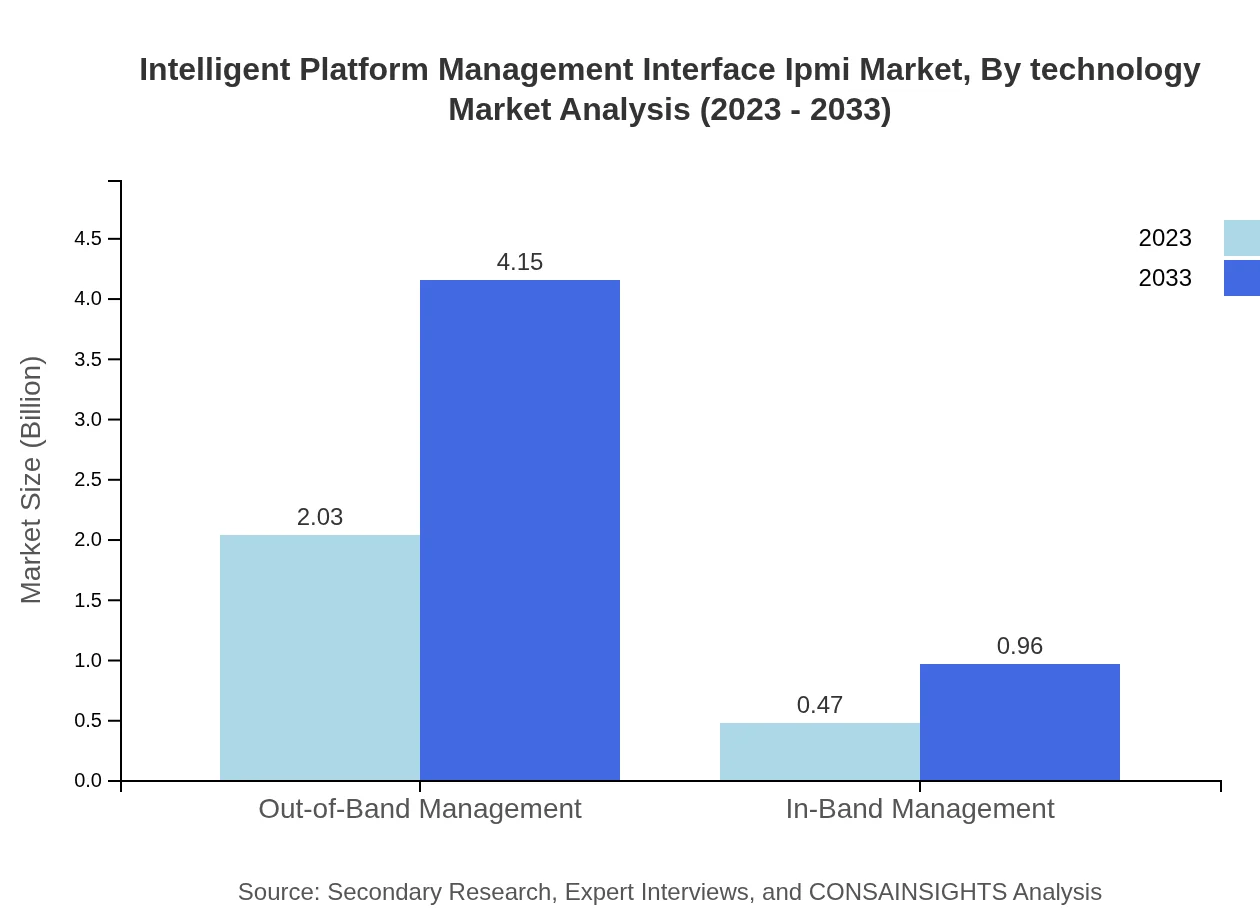Intelligent Platform Management Interface Ipmi Market Report
Published Date: 31 January 2026 | Report Code: intelligent-platform-management-interface-ipmi
Intelligent Platform Management Interface Ipmi Market Size, Share, Industry Trends and Forecast to 2033
This report offers a comprehensive analysis of the Intelligent Platform Management Interface (IPMI) market from 2023 to 2033, covering market dynamics, size, industry trends, and regional insights.
| Metric | Value |
|---|---|
| Study Period | 2023 - 2033 |
| 2023 Market Size | $2.50 Billion |
| CAGR (2023-2033) | 7.2% |
| 2033 Market Size | $5.11 Billion |
| Top Companies | Dell Technologies, Hewlett Packard Enterprise (HPE), IBM Corporation, Supermicro , Lenovo |
| Last Modified Date | 31 January 2026 |
Intelligent Platform Management Interface IPMI Market Overview
Customize Intelligent Platform Management Interface Ipmi Market Report market research report
- ✔ Get in-depth analysis of Intelligent Platform Management Interface Ipmi market size, growth, and forecasts.
- ✔ Understand Intelligent Platform Management Interface Ipmi's regional dynamics and industry-specific trends.
- ✔ Identify potential applications, end-user demand, and growth segments in Intelligent Platform Management Interface Ipmi
What is the Market Size & CAGR of Intelligent Platform Management Interface IPMI market in Year?
Intelligent Platform Management Interface IPMI Industry Analysis
Intelligent Platform Management Interface IPMI Market Segmentation and Scope
Tell us your focus area and get a customized research report.
Intelligent Platform Management Interface IPMI Market Analysis Report by Region
Europe Intelligent Platform Management Interface Ipmi Market Report:
Europe's market is set to increase from $0.75 billion in 2023 to $1.54 billion by 2033. The rise in regulations around IT security and the need for improved data management are driving forces in the region.Asia Pacific Intelligent Platform Management Interface Ipmi Market Report:
In the Asia Pacific region, the IPMI market is expected to grow from $0.49 billion in 2023 to $0.99 billion by 2033. Countries like China, Japan, and India are significantly investing in data centers, boosting the demand for IPMI technologies.North America Intelligent Platform Management Interface Ipmi Market Report:
North America dominates the IPMI market, forecasted to grow from $0.82 billion in 2023 to $1.67 billion by 2033. The U.S. leads this growth with significant investment in cutting-edge IPMI solutions for data center efficiency.South America Intelligent Platform Management Interface Ipmi Market Report:
The South American market is predicted to expand from $0.21 billion in 2023 to $0.43 billion by 2033. Brazil and Argentina are the key players, focusing on upgrading their IT infrastructure.Middle East & Africa Intelligent Platform Management Interface Ipmi Market Report:
The Middle East and Africa market is expected to grow from $0.23 billion in 2023 to $0.48 billion by 2033. The growing IT infrastructure and demand for remote management solutions are key drivers in this region.Tell us your focus area and get a customized research report.
Intelligent Platform Management Interface Ipmi Market Analysis By Product Type
The IPMI market is categorized into software, hardware, and services. In 2023, the software segment is valued at $1.68 billion, projected to reach $3.43 billion by 2033, dominating the market with a share of 67.1%. Hardware and services hold shares of 21.43% and 11.47% respectively, indicating their significant roles in the ecosystem.
Intelligent Platform Management Interface Ipmi Market Analysis By Application
By application, the market is classified into data centers, edge computing, cloud computing, and enterprise IT. Data centers represent a substantial share, with a market size of $1.37 billion in 2023, rising to $2.81 billion by 2033. Edge computing and cloud computing show rapid growth, indicating a shift towards more decentralized computing environments.
Intelligent Platform Management Interface Ipmi Market Analysis By Deployment Model
The market is segmented into on-premises and cloud deployment models. The on-premises segment is the largest, valued at $2.03 billion in 2023 and expected to reach $4.15 billion by 2033, capturing an 81.17% market share. Cloud solutions are also gaining traction, representing an 18.83% share in 2023.
Intelligent Platform Management Interface Ipmi Market Analysis By End User Sector
Major end-user sectors include IT, telecommunications, healthcare, and education. The IT sector holds a leading market share of 40.88% in 2023, driven by extensive server use. Telecommunications and healthcare are also significant contributors, indicating the diverse application of IPMI solutions across industries.
Intelligent Platform Management Interface Ipmi Market Analysis By Technology
The market is driven by advancements in automation, remote management capabilities, and integration with AI technologies. Emerging technologies are set to redefine the IPMI landscape, enhancing system reliability and reducing management complexity.
Intelligent Platform Management Interface IPMI Market Trends and Future Forecast
Tell us your focus area and get a customized research report.
Global Market Leaders and Top Companies in Intelligent Platform Management Interface IPMI Industry
Dell Technologies:
A key player offering robust IPMI solutions and advanced server management software that enhances data center efficiency.Hewlett Packard Enterprise (HPE):
Provides cutting-edge IPMI solutions focused on security and automation to optimize IT resource management.IBM Corporation:
Known for its sophisticated integrated management tools that leverage IPMI for enterprise solutions.Supermicro :
Offers a wide range of IPMI-enabled solutions tailored for high-performance computing and data center operations.Lenovo :
Provides innovative IPMI solutions designed for ease of use and integrated server management in diverse environments.We're grateful to work with incredible clients.









FAQs
What is the market size of Intelligent Platform Management Interface (IPMI)?
The Intelligent Platform Management Interface (IPMI) market is currently valued at $2.5 billion with a projected CAGR of 7.2% from 2023 to 2033. This growth is indicative of increasing demand for enhanced server management to optimize data center operations.
What are the key market players or companies in the IPMI industry?
Key players in the IPMI industry include major technology firms specializing in hardware manufacturing, software development, and integrated solutions. These firms leverage innovative technologies to offer advanced IPMI solutions, contributing to the market's dynamic growth.
What are the primary factors driving the growth in the IPMI industry?
Key drivers for growth in the IPMI industry include the rising need for efficient server management, increased demand for remote monitoring capabilities, and the expansion of data centers. These factors highlight the importance of robust IPMI solutions in modern IT infrastructures.
Which region is the fastest Growing in the IPMI market?
North America is the fastest-growing region in the IPMI market, with a market size expected to grow from $0.82 billion in 2023 to $1.67 billion in 2033. This growth reflects the region's technological advancements and demand for efficient management systems.
Does ConsaInsights provide customized market report data for the IPMI industry?
Yes, ConsaInsights offers customized market report data for the IPMI industry. Clients can access tailored insights that meet their specific requirements, aiding informed decision-making and strategic planning in the market.
What deliverables can I expect from this IPMI market research project?
Deliverables from the IPMI market research project include comprehensive reports on market size, segment analysis, regional performance, trends, and growth forecasts. These insights empower stakeholders to make strategic investment decisions.
What are the market trends of IPMI?
Current market trends in the IPMI sector include the rising demand for out-of-band management, solutions for edge computing, and integration with cloud-based services. These trends reflect an evolution towards more adaptive and efficient IT management practices.

